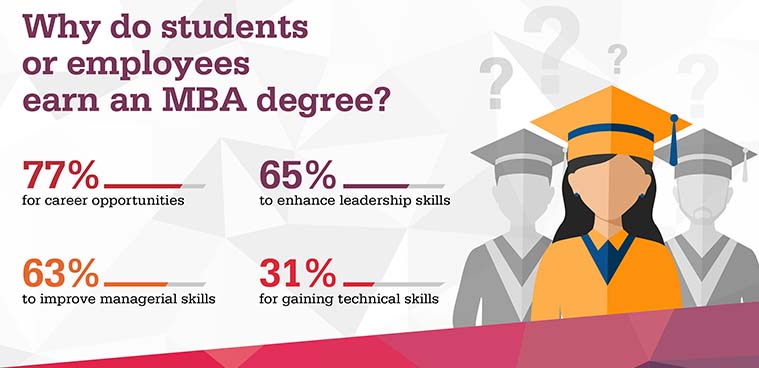From Finance to Marketing: Explore the Full Range of MBA Course Details

Blog / February 12, 2025
mba course detailsmba course feesmba course durationBusinesses around the world consider the Master of Business Administration (MBA) degree highly valuable as it enables students to learn complex business principles together with leadership expertise and strategic thinking capabilities. The history of the MBA program began in the early 20th century with its inaugural function at Harvard University in 1908. The degree program has evolved over time to suit current trends and global business requirements. The contemporary MBA degree, or rather MBA degree of the 21st century, provides specializations that enable students to delve deep into the intricacies of business and its diverse fields like finance, marketing, human resources, operations, entrepreneurship and many more, which prepares them for not just one but different sectors.
The MBA degree serves as a gateway to managerial positions, leading to career promotion and possible startup creation. Prospective students must grasp MBA course details from different institutions when selecting the right program that fulfills their future career objectives. According to a report by Market Research Trade, the global MBA Education Market size is expected to record a CAGR of 15.6% from 2023 to 2032. In 2022, the market size is projected to reach a valuation of USD 47.1 billion. By 2032, the valuation is anticipated to reach USD 83.08 billion.

Source: https://infographicjournal.com/
MBA Course Details: Specializations and Curriculum
An MBA program is crafted to provide a blend of theoretical knowledge and practical applications in business management. The curriculum is divided between fundamental topics and complementary subjects, enabling students to choose their specialization area. The program covers major specializations, among them are:
- Finance
Students specializing in this field study how to organize finances and their competencies in investment oversight, risk assessment and corporate funding concepts. Students in the fields of banking, together with financial consulting and asset management, will find this specialization optimal.
- Marketing
The curriculum covers how customers behave and react to digital marketing, branding strategies, and market research approaches. Graduates who complete this specialization are qualified for work in advertising roles and career positions in sales and brand management.
- Human Resource Management (HRM)
Students who want to work in recruitment, training, and development should consider this field because it includes talent acquisition, employee relations, performance management and organizational behavior expertise.
- Operations Management
Operations Management specializes in supply chain management, logistics, and production planning to help students who want to optimise processes and efficiency.
- Entrepreneurship
The specialization targets future business owners who study business planning combined with venture capital alongside innovation management and startup methodologies.
- Business Analytics
This specialized field of study enables students to acquire analytical capabilities to analyze data and forecast trends for data-based business choices.
Most MBA programs begin with fundamental courses during their first year, which include:
- Principles of Management
- Managerial Economics
- Financial Accounting
- Marketing Management
- Business Statistics and
- Organizational Behavior
Students decide their subjects for the second year according to specialization, internships, and project work experiences.
MBA Course Duration
The MBA course duration varies based on the type of program and institution. Here are some common formats:
- Full-Time MBA: A Full-Time MBA Program extends for two years, during which students learn all aspects of business management through structured education.
- Executive MBA (EMBA): The Executive MBA (EMBA) delivers its curriculum to working professionals during a one to two-year period through adaptable learning arrangements.
- One-Year MBA: The One-Year MBA presents intensive education that shortens the learning period to 12 to 15 months and benefits those who aim for speedy career progression.
- Part-Time MBA: Students enrolled in this program can continue their jobs since Part-Time MBA spans two to four years.
- Online MBA: The Online MBA incorporates flexible settings through self-paced education, which normally requires two to three years.
MBA Course Fees
The MBA course fees depend on the institution, location, and program type. The total cost of enrollment relies on tuition expenses combined with room costs, as well as necessary student textbooks and miscellaneous expenses. Here’s a general breakdown:
- Top Business Schools: Tuition fees for prestigious programs range from INR 10 lakh to INR 30 lakh.
- Public Universities: Fees are usually more affordable, ranging between INR 5 lakh to INR 15 lakh.
- Online and Distance Learning MBAs: These programs typically cost between INR 1 lakh and INR 5 lakh.
- Executive MBAs: Given their specialized nature, these programs may cost anywhere between INR 10 lakh and INR 25 lakh.
Many institutions also offer scholarships, financial aid, and loan options to help students manage costs.
Your Gateway to Excellence: MBA at Shiv Nadar University (Institution of Eminence)
Shiv Nadar University offers a well-structured MBA (Global) program crafted to respond to industry needs and provide high-quality education to students to become ‘industry ready’ and ‘entrepreneurially oriented’. Following are some key takeaways from the program:
- Students tackle authentic problems by conducting business cases, projects and activities.
- The program provides tools for handling actual business obstacles.
- Apply skills and knowledge acquired through coursework in team research and presentations
- Foster personal and professional connections with diverse individuals
- Interact and network with industry thought leaders and influencers
- Foster a worldwide approach to business while recognizing how every element within the industry remains connected to one another.
The MBA (Global) program curriculum at the School of Management and Entrepreneurship is uniquely designed to prepare students to succeed in the world of the coming times. The coursework combines different special features of digital transformation, technology adoption, entrepreneurship principles, global readiness, and experiential learning with marketing, finance, human resource management and operations, and strategic planning subjects.
To Wrap it Up
An MBA is a transformative degree that enhances career prospects across multiple industries. Understanding MBA course details, including course duration and fees, is essential for making an informed decision. Whether opting for finance, marketing, or business analytics, an MBA equips students with the skills and knowledge to thrive in competitive markets. Choosing the right institution, such as Shiv Nadar University, can further enrich the learning experience and open new avenues for professional growth.